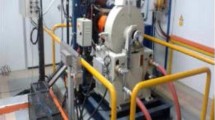Abstract
An experimental study on the combustion and emission characteristics of a direct-injection spark-ignited engine fueled with natural gas/hydrogen blends under various ignition timings was conducted. The results show that ignition timing has a significant influence on engine performance, combustion and emissions. The interval between the end of fuel injection and ignition timing is a very important parameter for direct-injection natural gas engines. The turbulent flow in the combustion chamber generated by the fuel jet remains high and relative strong mixture stratification is introduced when decreasing the angle interval between the end of fuel injection and ignition timing giving fast burning rates and high thermal efficiencies. The maximum cylinder gas pressure, maximum mean gas temperature, maximum rate of pressure rise and maximum heat release rate increase with the advancing of ignition timing. However, these parameters do not vary much with hydrogen addition under specific ignition timing indicating that a small hydrogen fraction addition of less than 20% in the present experiment has little influence on combustion parameters under specific ignition timing. The exhaust HC emission decreases while the exhaust CO2 concentration increases with the advancing of ignition timing. In the lean combustion condition, the exhaust CO does not vary much with ignition timing. At the same ignition timing, the exhaust HC decreases with hydrogen addition while the exhaust CO and CO2 do not vary much with hydrogen addition. The exhaust NOx increases with the advancing of ignition timing and the behavior tends to be more obvious at large ignition advance angle. The brake mean effective pressure and the effective thermal efficiency of natural gas/hydrogen mixture combustion increase compared with those of natural gas combustion when the hydrogen fraction is over 10%.
Similar content being viewed by others
References
Cho H M, He Bangquan. Spark ignition natural gas engines-A review. Energy Conversion and Management, 2007, 48(2): 608–618
Van Blarigan P, Keller J O. A hydrogen fuelled internal combustion engine designed for single speed/power operation. International Journal of Hydrogen Energy, 1998, 23(7): 603–609
Shrestha S O B, Karim G A. Hydrogen as an additive to methane for spark ignition engine applications. International Journal of Hydrogen Energy, 1999, 24(6): 577–586
Das L M, Rohit G, Gupta P K. A Comparative evaluation of the performance characteristics of a spark ignition engine using hydrogen and compressed natural gas as alternative fuels. International Journal of Hydrogen Energy, 2000, 25(8): 783–793
Sierens R, Rosseel E. Variable composition hydrogen/natural gas mixtures for increased engine efficiency and decreased emissions. Journal of Engineering for Gas Turbines and Power, 2000, 122(1): 135–140
Bauer C G, Forest T W. Effect of hydrogen addition on the performance of methane-fueled vehicles, Part I: Effect on S.I. engine performance. International Journal of Hydrogen Energy, 2001, 26(1): 55–70
Orhan A S, Zafer D, Nafiz K, et al. Internal combustion engines fueled by natural gas-hydrogen mixtures. International Journal of Hydrogen Energy, 2004, 29(14): 1527–1539
Marie B. Engine characteristics of emissions and performance using mixtures of natural gas and hydrogen. Energy, 2007, 32(4): 482–489
Raju A V, Rama S, Ramesh A, et al. Effect of hydrogen induction on the performance of a natural-gas-fuelled lean-burn SI engine. Journal of the Institute of Energy, 2000, 73(496): 143–148
Huang Zuohua, Wang Jinhua, Liu Bing, et al. Combustion characteristics of a direct-injection engine fueled with natural gas-hydrogen mixtures. Energy and Fuels, 2006, 20(2): 540–546
Huang Zuohua, Wang Jinhua, Liu Bing, et al. Combustion characteristics of a direct-injection engine fueled with natural gas-hydrogen blends under various injection timings. Energy and Fuels, 2006, 20(4): 1498–1504
Hoekstra R L, Collier K, Mulligan N, et al. Experimental study of a clean burning vehicle fuel. International Journal of Hydrogen Energy, 1995, 20(9): 737–745
Bell S R, Gupta M. Extension of the lean operating limit for natural gas fueling of a spark ignited engine using hydrogen blending. Combustion Science and Technology, 1997, 123(1–6): 23–48
Allenby S, Chang W C, Megaritis A, et al. Hydrogen enrichment: A way to maintain combustion stability in a natural gas fuelled engine with exhaust gas recirculation, the potential of fuel reforming. Journal of Automobile Engineering, 2001, 215(3): 405–418
Jeffrey N P, Richard J R. Hydrogen-enriched natural gas offers economic NOx reduction alternative. Power Engineering (Barrington, Illinois), 2000, 104(5): 3–6
Huang Zuohua, Zeng Ke, Yang Zhongle. Study on Combustion Characteristics of Direct Injection Natural Gas Engine by Using a Rapid Compression Machine. Transaction of CSICE, 2001, 19(04): 314–322
Liu Liangxin, Huang Zuohua, Jiang Deming, et al. Combustion characteristics of a direct injection natural gas engine under various fuel injection timings. Transactions of CSICE, 2005, 23(5): 467–474 (in Chinese)
Toshio S, Hiroyuki S. Applicability of heat transfer equation to hydrogen combustion. JSAE Review, 2002, 23: 303–308
Heywood J B. Internal Combustion Engine Fundamentals. New York: McGraw-Hill, 1988, 383–390
Author information
Authors and Affiliations
Corresponding author
Additional information
__________
Translated from Transactions of CSICE, 2006, 24(5): 394–401 [译自:内燃机学报]
Rights and permissions
About this article
Cite this article
Wang, J., Huang, Z., Liu, B. et al. Effect of ignition timing and hydrogen fraction on combustion and emission characteristics of natural gas direct-injection engine. Front. Energy Power Eng. China 2, 194–201 (2008). https://doi.org/10.1007/s11708-008-0035-0
Published:
Issue Date:
DOI: https://doi.org/10.1007/s11708-008-0035-0




